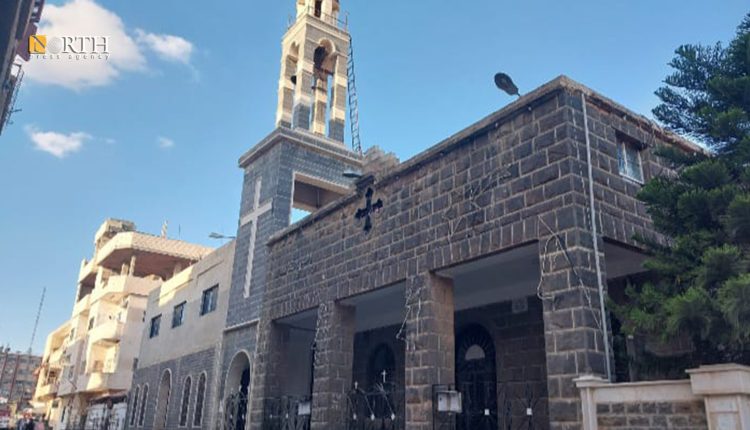
By Wisam al-Abazid
DARAA, Syria (North Press) – Every Sunday, Musa Khalil opens the door of the church of Sayyidet al-Beshara in the city of Daraa, southern Syrian, but hundreds of congregants who once packed its pews are missing.
Dressed in a black robe, the bishop Khalil told North Press that “Hundreds of Christian families lived in the city of Daraa before the start of the conflict, but now the number has dropped.”
He confirmed that the Christian community in Daraa not only continue to hold their religious and celebratory rituals but also experience a welcoming environment amid Muslim brothers.”
“They have not faced any mistreatment; on the contrary, they actively share their joys and sorrows with the Muslim residents,” he added
The church never stopped holding the annual prayers, even when it found itself surrounded by the different conflicted parties, the bishop added.
Throughout the years of the war, the population of the Christian community in Syria in general has experienced a significant decline. But unlike in other Syrian cities, Daraa had the lowest rate of emigration.
The bishop believes that the reason behind this is that most of the opposition fighters in Daraa are locals, making the community safer in the face of spreading sectarian violence.
Christians in Daraa
The Christian community in Syria in general and in Daraa particularly has faced many challenges in recent years, including economic difficulties, sectarian persecution, as a result, their numbers have decreased by half since the start of the war.
The Bishop of the Archdiocese of Khabab town, in the northern part of Daraa, Afeef Sawaya, said that the Christians in Daraa are spread across multiple villages and towns within the governorate. These include the villages of Tisiyah, Samj, and Samaqiyat in the eastern part of the governorate, as well as other areas such as Ghasm, Rakham, and Sharayah, along with the city of Izraa and the town of al-Masmiyah.
Additionally, there is a significant Christian presence in the northern part of Daraa, including the villages of Khabab, Bassir, Tubna, Muthabin, Shaqra, and Namar.
However, the exact percentage of those who have remained in Daraa governorate is unclear. It is estimated that approximately 35 percent of the Christian community has migrated, according to Sawaya.
He further explained that a majority of the region’s young people have left to avoid military service and engagement with the government forces. They have also sought to escape the challenging security conditions and the effects of the war in previous years.
There is no doubt that this social change will have a long-term impact on Syria, which has experienced many demographic upheavals throughout the years of the civil war, he noted.
Christian community and demonstrations
At the beginning of the Syrian crisis, the Syrian government tried to arm the Christian populations and encourage them to join the Syrian security forces, but many Christians in Daraa preferred to send their children abroad rather than die on the battlefield, Sawaya noted.
Christians were branded as associated with the Assad government but many Christians in Daraa secretly supported the protestors and actively participated in the demonstrations, the bishop added.
Furthermore “Around 30 young individuals were hidden in the church of Sayyidet al-Beshara in Daraa city, during the violent Wednesday massacre that occurred at the beginning of the war in 2011,” he noted.
He further added “When security forces attempted to raid the church, Christians stood up against them, refusing to let them enter.”
Christian families also hide many young people at their houses risking their families to protect the demonstrations.
Not to mention the participation of Christian youth in protests at the al-Omari Mosque in Daraa al-Balad at the onset of the war in 2011.
Some Christian areas in Daraa, such as the villages of Khabab and Baser, have largely been able to avoid the fighting. They have neither joined the demonstrations nor thrown their weight behind the Assad regime.
No attacks have been carried out against Christians in Daraa, neither by the government nor by the armed groups, the bishop confirmed.
“We are a united and cohesive people. We share common customs, traditions, songs, celebrations, dialect, folk costumes, and popular cuisine,” The Bishop of the Archdiocese of Khabab concluded.
